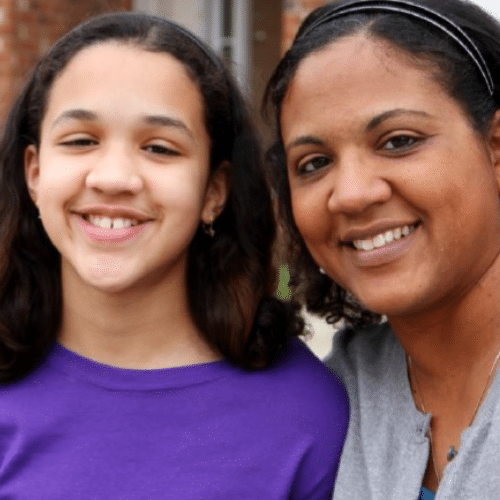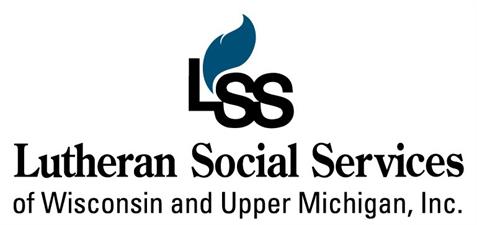Home > Our Work > Children, Youth & Families > Family Stabilization> Lutheran Services in Action SDOH Behavioral Health
LUTHERAN SERVICES IN ACTION
A Case Study
Sustaining a Social Determinants of Health Approach to Improving Children’s Behavioral Health
Mental and behavioral health among children has emerged as a leading public health concern in recent years. Before COVID-19, one in five children held a mental disorder, yet less than a quarter of those children received services from mental health providers (CDC, 2023). The pandemic exacerbated mental health challenges in children while also making it harder for them to access the help they needed. While the reasons for mental health challenges in children are complex, there is strong evidence that social determinants of health (SDOH), such as family relationships, poverty, food access, housing and school environments can be both protective and contributing factors.


Lutheran Social Services of Wisconsin and Upper Michigan (LSS) are a leading Lutheran Services in America member that have developed a unique whole family approach to address behavioral health needs through both a clinical and SDOH lens that is getting results. Over the past two years, their School-Centered Mental Health Initiative has partnered with schools in Milwaukee, Wisconsin, to serve 189 children and their families in need of support. The Initiative identifies and addresses behavioral and social and economic concerns through both direct service delivery and community partnerships, while using data and family feedback to continuously strengthen practices, outcomes and prove value, so they can serve more and more children and families in need.
The LSS approach to creating and sustaining this whole family SDOH model is an exemplar of excellence and innovation in attending to sustainability of social services, aligned with the approach outlined in the Chapin Hall and Lutheran Services in America Toolkit, “Advancing Equitable Outcomes in Child Welfare: A Toolkit for Sustainability.”
The Lutheran Advantage: Rethinking Sustainability
Sustainability conversations in the social sector often start and end with questions about money. Is there enough funding to deliver services? Will that funding be around next year? Working with Lutheran Services in America members engaged in our multi-state Family Stabilization Initiative, Lutheran Services in America and Chapin Hall recently distilled lessons on sustainability into an easy-to-us framework that centers race equity and highlights a set of six components that advance our collective understanding of what it takes to sustain impactful community-driven work.
Using the framework, this case study profiles how LSS has addresses these six components in their School-Centered Mental Health Initiative.
6 COMPONENTS OF SUSTAINABILITY
Leadership Capacity and Change Management
When LSS President and CEO Héctor Colón joined the 140-year-old organization in 2017, he challenged the team to think differently. As Amanda Krzykowski, Director of Performance and Quality Improvement, recalls, Colón “challenged us to think about what are we doing well, and identify what we could be doing better? If we were more innovative, what would we do differently?” At the time, the LSS team had been implementing a traditional school-based therapist model to address behavioral health concerns with school partners, but Krzykowski decided, “We knew we could do better if we could get the families involved.”
To support the transition to a more holistic model that included the family and school environments, Krzykowski took the time to build a data-driven culture. She noted the program team was used to collecting a lot of outputs, such as number of sessions, and saw that the organization was focused on compliance and had not been able make the leap to measure the difference made by LSS in the lives of the individuals and families served. Over several years, she empowered the teams by giving them choices. For example, teams must align with LSS agency-wide outcomes, but are only required to select two of the five agency-wide outcomes to ensure relevance to their work and buy-in. The team now engages in consistent quality improvement using data dashboards and team dialogue.
“Annually LSS serves nearly 30,000 individuals and their families, 94% of whom say that we have improved the quality of their life. That means something to us. We want to know that we're truly making a difference in their lives, and we look at broader social determinants of health to help us determine that.”
Héctor Colón
President and CEO
“We need to start engaging and supporting parents in order to impact their home life. We can't just talk to the student in a room once a week and expect things to change. So, we need to impact the environments [school and home] around the student.”
Amanda Krzykowski
Director of Performance and Quality Improvement
Program Fidelity
With getting families involved at the heart of their revised strategic vision, the LSS team created a model with some non-negotiables for the program. While the team first considered offering schools various “tiers” of the model, they determined not to water-down their vision. Krzykowski said, “We made the decision, if this is a model we believe in and the family coach is necessary, then this is where we are going to invest our time and resources.”
The family coaches work with families to both provide services such as skill development and psychoeducation and connect families to SDOH services and supports. Specifically, early in the relationship-building process, coaches screen families for SDOH needs, design individualized interventions and do home visitation.
One of the superpowers of the family coach model is going above-and-beyond to engage families. Krzykowski relayed the story of a parent who said they had no time to meet, so the family coach rode the public bus with them on their commute and held the consultation on the bus. The program strives to meet parents’ authentic needs. Krzykowski noted, “They [parents] experience barriers. They worry about basic needs and encounter barriers when trying to access systems. We connect and support them.”
“I feel like, families are looking at me to be an expert, and in being vulnerable with them I can explain that I am not. But my role is to give it my 100% to find whatever it is that they need and build on my colleagues and the partners to find that for them.”
Larissa Mendoza
Bilingual Family Coach
Effective Staffing
In addition to family coaches, who hold a caseload of about 40 families, the model includes therapists. Therapists work with schools and family coaches to identify and address behavioral health concerns through one-on-one therapy sessions. In addition, they conduct “crisis” student sessions to support the students and school staff and family therapy sessions. The role is a critical driver of value for schools, children and families and works inside the school where children are most accessible for behavioral health support.
LSS has recognized that effective staffing is impacted by a broad range of factors, including turnover in partner school staffing. Recognition that schools are experiencing staff shortages has required adaptation around data collection. The organization has also recognized that SDOH needs among families have risen in the community in recent years. These factors have seeded reflection on how to help family coaches balance building SDOH partnerships and still deliver essential model elements, such as parenting skills and psychoeducation.

Community Resource Mobilization
Effective community resource mobilization starts with knowing what children and families want and need to thrive. LSS initially sought an off-the-shelf family assessment tool that could fit the initiative but could not find one with the holistic focus the initiative required. In 2018, LSS’s Performance and Quality Improvement team created a SDOH tool that focuses on identifying SODH needs (e.g., food security, housing, utilities, transportation, childcare and health care), income and cost of living and resilience, inclusion and community connectedness They have also worked with local researchers at both Marquette and the University of Wisconsin-Milwaukee. The tool is supported by data collection conducted by their academic partner who conducts family and staff interviews. This data guides service delivery and allows for disaggregation by race, gender and other factors to promote equity.
Family Voices:
Milwaukee families served by the initiative were most often worried about three things, answering affirmatively to the following questions:
1. “Your food would run out before you had money to buy more.”
2. “You may not have a place to live in the next three months.”
3. “Afraid you might be hurt in your home.”
Given the many needs families might be presenting, the tool supports a triaging of needs, asking families to rate each of the “worries” as something they either experience Always, Often, Some of the Time or None of the Time. Among families who completed the screener in 2023, 40% presented with at least three SDOH needs and 65% with at least two.
Recognizing LSS cannot often provide all of the SDOH services and supports requested, they have been conscious about building partnerships around these issues. For example, the organization’s housing programs work directly with housing developers to build affordable housing units in low-income communities. The new units provide more options for families in their communities. LSS also provides service coordination and property management services in affordable housing units.
Effective Family Referrals
The model thrives when therapists and coaches become a seamless part of school teams and don’t, as Krzykowski notes, “need a visitor badge.” One of the initiative’s therapists serves two middle schools and one elementary school within a mile of each other, with a 98% Hispanic population. When one of the schools had a safety issue, they were already embedded and able to give direction and assist school staff in developing a safety plan right away. In other cases, therapists will run “parent cafes” open to all parents at the school to build relationships and provide education and resources that meet parents’ needs.

Teachers and school counselors have come to rely on the Initiative’s therapists to address both behavioral health concerns—which often manifest as poor peer relationships, depression, anxiety, impulsivity, and aggressive behavior—and school performance issues such as truancy. In one case, the school was at a loss as to how to support a family with persistent truancy issues. The LSS therapist and family coach worked with the mother and discovered that she had been experiencing bouts of depression. The depression symptoms made it difficult for her to wake up in the morning and when she would bring the children into school late, she felt reprimanded. The therapist and coach pivoted the school to a strength-based approach—congratulating the mother when children did make it to school—and called her each morning to initiate the morning routine. Soon, the children were attending school regularly, and the mother didn’t need the morning calls.
Financial Investments
The Initiative has primarily been seeded by private funding, including several foundations that have granted multi-year investments. Participating schools also do what they can, using Every Student Succeeds Act (ESSA) dollars. In some cases, a state grant program funded by the federal Substance Abuse and Mental Health Agency (SAMHSA) called Project AWARE is tapped by the school for support. Reflecting their family-focused, all-in approach, the LSS team will also bill private insurance and work with comprehensive community services reimbursement programs.
Long-term, LSS leadership is active in cultivating supportive state public policy and Medicaid funding for the kind of coordination and services embedded in the Initiative. One approach they have used is talking to Lutheran peers in other state and comparing Medicaid policies to inform their education and advocacy. LSS has produced White Papers and data, testified at the Statehouse and advanced legislation with bipartisan legislative champions. In addition, they are leaders in a broad statewide coalition with a supportive public policy agenda. “Ultimately, we need either legislative changes or some administrative rules changed,” said Krzykowski.
Strengthening Outcomes for Both Children and Families
In the 2022–2023 school year, their School-Centered Mental Health Initiative served 89 students and families, hosting 940 one-on-one therapy sessions, 630 coaching sessions and 2,358 family coach contacts (phone calls and emails).
Given their whole family approach, the Initiative tracks improvements in both child, youth, and family outcomes across behavioral health and SDOH indicators. Data from their 2022–2023 school year shows impact across a range of outcomes.
Behavioral Health Outcomes:
- 72% of parents reported their child had improved symptoms of anxiety and depression.
- 73% of students self-reported and 77% of parents reported improved peer relationships.
- Children and youth showed at least one clinical level of improvement in the domains of prosocial skills (48%), emotional concerns (46%), hyperactivity/impulsivity (40%), conduct concerns (39%) and peer problems (33%).
Family Survey Responses:
72%
of parents reported their child had improved symptoms of anxiety and depression.
73%
of students self-reported improved peer relationships.
77%
of parents reported their child has improved peer relationships.
SDOH Outcomes:
- All families presenting with SDOH needs indicated improvements in their self-identified areas of need.
- 28% of families presenting with one area of SDOH need exited the program reporting no unmet needs.
- 92% of parents report they have the resources they need to maintain stable housing.
- 86% of parents report they have at least one supportive person they can talk to about their feelings.
KEY INSIGHTS FOR SUSTAINABILITY
Data Supports Sustainability
- Utilize data to gauge the effectiveness of initiatives and assess evolving support needs for children, youth and families.
- Engage in continuous learning and adaptation to better address the evolving needs of families and to address staffing implications.
Individualized Services Supports Sustainability
- Recognize the importance of tailored support in addressing diverse child, youth and family needs.
- Enhance awareness and understanding of SDOH among all leaders and community partners to drive aligned programming and mental models.
Attention to Culture Supports Sustainability
- Promote a team culture of collaboration and innovation, with an emphasis on proactive problem-solving and inclusion of community partners.
- Facilitate ownership by staff to empower positive differences in service delivery.

Conclusion
Sustaining impactful social services requires attention to race equity and a set of six key sustainability components, which go well beyond funding. Lutheran Social Services of Wisconsin and Upper Michigan’s School-Centered Mental Health Initiative is an exemplar of the power of attending to these factors to drive lasting improvements in behavioral health and access to SDOH services and supports for Milwaukee children, youth and families. Amidst a rapidly changing landscape, their multi-faced efforts are positioning the initiative for lasting impact and growth, so more children and families can thrive.
JOIN OUR COALITION FOR BETTER SOCIAL CARE (CBSC)
The Coalition for Better Social Care is dedicated to advancing Lutheran social ministries’ innovation in aligning health and social care, ensuring that all individuals receive the comprehensive care they need to thrive.
Through our peer network of members, we accelerate the adoption and funding of innovative social care delivery programs proven to reach isolated and underserved populations. By connecting individuals to services and supports, we empower them to live with dignity and respect in their chosen homes and communities.
Join us in our mission to create a more equitable and compassionate society through better social care.
ACKNOWLEDGMENTS
Lutheran Services in America would like to express our appreciation to Héctor Colón, Amanda Krzykowski, Larissa Mendoza and Michelle Naples of Lutheran Social Services of Wisconsin and Upper Michigan for sharing their time, expertise, and insights as the basis for this case study.